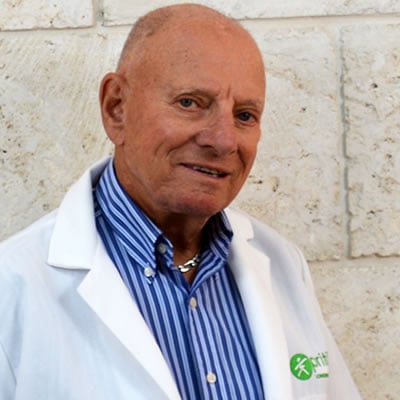Testosterone Therapy Pros and Cons
The initial findings of the Testosterone Trials are now available in four new studies on testosterone therapy. All were published in the Journal of the American Medical Association and JAMA Internal Medicine. Here is a summary of their results.

Testosterone Therapy Pros and Cons
About two years ago, Pritikin Perspective reviewed1 the risks and benefits of testosterone therapy for men 60 and older who were experiencing decreases in mood, cognition, energy, and libido.
We cautioned against this therapy for men who did not have abnormally low levels of testosterone and who were simply experiencing the normal effects of aging. Research had shown that testosterone supplements only resulted in minimal reduction of symptoms. Moreover, medical experts were voicing concerns about the possible negative consequences of this treatment, including prostate cancer and cardiovascular disease.
Lifestyle Over Drugs
The only safe and effective way to elevate testosterone levels and improve symptoms for some men with low T were lifestyle changes—diet, exercise, and weight loss—like those recommended by the Pritikin Program and taught at the Pritikin Longevity Center in Miami.

T Trials
Recognizing the need for further study on the pros and cons of testosterone replacement, our article anticipated the upcoming results of the Testosterone Trials (T Trials).
The initial findings of these trials are now available in four2,3,4,5 of five new studies on testosterone therapy. All five were published in the Journal of the American Medical Association (JAMA) and JAMA Internal Medicine.
The men in the T Trial placebo-controlled, randomized studies were over 65 with abnormally low testosterone levels caused by nothing more than advanced age. The fact that more than 50,000 subjects needed to be screened to find 788 men with clinically low testosterone indicates that low T is hardly typical in older men.
Despite the low number of men with truly low testosterone levels as well as concerns about dangerous side effects, the sales of testosterone supplements skyrocketed in the United States by ten times between 2000 and 2011.
To better clarify the risks and benefits, the T Trials – seven trials at 13 major medical centers in partnership with the National Institute on Aging and the National Institutes of Health – studied the effects of testosterone therapy for one year.
Benefits
Together, the trials showed that testosterone treatment increased bone density and strength, and corrected mild anemia. In addition, a T Trial6 published last year had shown that raising testosterone “had a moderate benefit with respect to sexual function and some benefit with respect to mood and depressive symptoms,” reported the authors.
No Improvement In Cognition
At the same time, the new data from the T Trials showed no improvement in memory or any other measure of cognitive ability.
Plaque Buildup
Most worrisome, the newly published data found that using testosterone therapy for one year compared with a placebo piled up the amount of plaque in the arteries, an early sign of heart disease. Warned lead investigator Peter J. Snyder in a University of Pennsylvania news release: “The increase of plaque buildup in the coronary artery shows that this treatment may also have some risk.”
That said, Dr. Snyder added that “treating 788 men for one year is far too few to draw conclusions about the clinical significance of the increase in coronary artery plaque volume and the cardiovascular risk of testosterone treatment.”
The hopeful news: Published in the same issue7 of JAMA Internal Medicine was an observational study on 8,808 men that showed that testosterone prescriptions were associated with a lower risk of cardiovascular outcomes, such as heart attacks, over a follow-up of about three years.
So, we now know more about testosterone therapy’s pros and cons. But we certainly don’t have the full story. Needed are larger and longer-term studies, especially focused on cancer and heart disease risks.

In the Meantime, What Should Men Do?
An editorial8 accompanied the publication of the studies. The author was Dr. David Handelsman, Professor of Reproductive Endocrinology & Andrology at the University of Sydney. It was titled “Testosterone and Male Aging: Faltering Hope for Rejuvenation.”
Dr. Handelsman asserted that the findings from these studies “do not materially change the unfavorable balance of safety and efficacy to initiate testosterone treatment for age-related declines in the hormone.”
Put simply, the risks outweigh any potential benefits.
Healthy Lifestyle | The Safe Solution
Dr. Handelsman advocated for diet, exercise, and weight loss as a safer solution for low testosterone that is caused by obesity and type 2 diabetes. The T Trials, he summed up, do not find that testosterone therapy is a panacea for the natural results of aging and may well carry unwarranted risks.
Do You Have Decreased Energy and Libido?
So where does this leave you if you’re experiencing decreased energy and libido?
First and foremost, see your doctor or a specialist to discuss your symptoms and to have a blood test to check testosterone levels.
If, in fact, your testosterone levels do prove abnormally low, you and your doctor can pinpoint the cause – possibly other health issues, or medications, or aging.
Your doctor may suggest a healthy diet and daily exercise to reduce your weight, control high blood sugar and/or diabetes, and raise your testosterone naturally. This, in turn, could improve your energy, libido, and general sense of well being. “This approach to low T is also the way to overall good health,” emphasizes Norman Blum, MD, physician and educator at the Pritikin Longevity Center.
If you’re already in good shape and following a heart-healthy lifestyle like Pritikin, have a thorough discussion with your doctor, ideally, an endocrinologist, recommends Dr. Blum. Drugs are always a matter of weighing risks versus benefits. For some men with low T – those with a low risk of heart disease and prostate cancer – the possible benefits of testosterone therapy, such as increased bone density, a better libido, and less depression, may outweigh the risks.
Always Ask About Side Effects
No matter what, if your doctor recommends testosterone therapy, the researchers in the T Trials would encourage you to ask about the possible side effects.
In the meantime, we will once again anticipate the further studies from the T Trials to clarify the pros and cons of testosterone therapy for age-related low T.
Yes, scientific research is slow and painstaking. And conclusions, once they do arrive, are often riddled with caveats. That’s science.
But there’s one thing science does know unequivocally: A healthy lifestyle like Pritikin has no caveats. No troublesome side effects. The news is all good. When you exercise daily and eat well, filling your day with outstanding whole foods like fruits, vegetables, whole grains, and beans, you tend to feel outstanding.
Want to feel 30 again? Nothing gets you closer than Pritikin.
Sources
- 1 Testosterone and Sex
- 2 JAMA, 2017; 317 (7): 708.
- 3 JAMA, 2017; 317 (7): 717.
- 4 JAMA Internal Medicine, Published online February 21, 2017. doi:10.1001/jamainternmed.2016.9539.
- 5 JAMA Internal Medicine. Published online February 21, 2017. doi:10.1001/jamainternmed.2016.9540.
- 6 New England Journal of Medicine, 2016; 374 (7): 611.
- 7 JAMA Internal Medicine. Published online February 21, 2017. doi:10.1001/jamainternmed.2016.9546.
- 8 JAMA, 2017; 317 (7): 699.